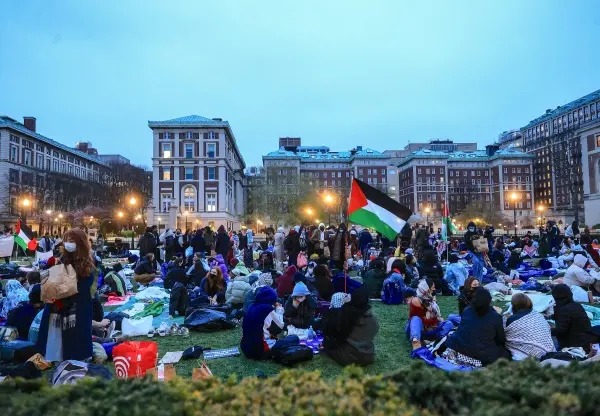Ahlulbayt News Agency: The interim president of Columbia University, Katrina Armstrong, is facing a widespread Israeli incitement campaign after she expressing her apology to protesters supporting Palestine and opposing the Israeli aggression in Gaza who were arrested by New York police, following the administration’s decision to clear the campus of protesters.
The Israeli newspaper Maariv reported that Columbia University has become a symbol of violent protests at universities in the United States, as demonstrations on campus reached unprecedented levels.
In response to a question about the university’s request to the New York Police to disperse a large camp and remove protesters from Hamilton Hall last April, Armstrong said, “I know this is a hard thing for me to say, but I understand that I sit in this position. So, if you can let everyone know who was harmed by that, I’m very sorry. I know it wasn’t me, but I’m really sorry.”
Armstrong’s comments came during her first interview with the “Columbia Spectator,” where she apologized to those who were injured or harmed due to the New York Police’s actions last April at the Gaza solidarity camp, where police made over 200 arrests.
Armstrong took her current position after the sudden resignation of former Columbia University President Nemat Shafik in August, following severe criticism over her handling of ongoing anti-Israel protests amidst the ongoing genocide in Gaza since October 7, 2023.
A report by Maariv described Armstrong’s apology as “moral decay and anti-Semitism, a controversial step that goes against what Columbia University needs.”
Armstrong faced intense backlash from members of the university’s Jewish community after she apologized to those who felt offended by the administration’s decision to clear anti-Israel protests on campus last spring.
Last August, Columbia President Nemat Shafik resigned after months of angry student protests against Israel and in support of Gaza, just one year into her presidency, which was marked by ongoing protests against the occupation, during which hundreds of students and many academics were arrested.
Shafik’s resignation came amid escalating tensions among various parties at the university, complicating the challenges faced by the new president, Katrina Armstrong, in her attempts to balance freedom of expression and safety on campus.
/129
The Israeli newspaper Maariv reported that Columbia University has become a symbol of violent protests at universities in the United States, as demonstrations on campus reached unprecedented levels.
In response to a question about the university’s request to the New York Police to disperse a large camp and remove protesters from Hamilton Hall last April, Armstrong said, “I know this is a hard thing for me to say, but I understand that I sit in this position. So, if you can let everyone know who was harmed by that, I’m very sorry. I know it wasn’t me, but I’m really sorry.”
Armstrong’s comments came during her first interview with the “Columbia Spectator,” where she apologized to those who were injured or harmed due to the New York Police’s actions last April at the Gaza solidarity camp, where police made over 200 arrests.
Armstrong took her current position after the sudden resignation of former Columbia University President Nemat Shafik in August, following severe criticism over her handling of ongoing anti-Israel protests amidst the ongoing genocide in Gaza since October 7, 2023.
A report by Maariv described Armstrong’s apology as “moral decay and anti-Semitism, a controversial step that goes against what Columbia University needs.”
Armstrong faced intense backlash from members of the university’s Jewish community after she apologized to those who felt offended by the administration’s decision to clear anti-Israel protests on campus last spring.
Last August, Columbia President Nemat Shafik resigned after months of angry student protests against Israel and in support of Gaza, just one year into her presidency, which was marked by ongoing protests against the occupation, during which hundreds of students and many academics were arrested.
Shafik’s resignation came amid escalating tensions among various parties at the university, complicating the challenges faced by the new president, Katrina Armstrong, in her attempts to balance freedom of expression and safety on campus.
/129

